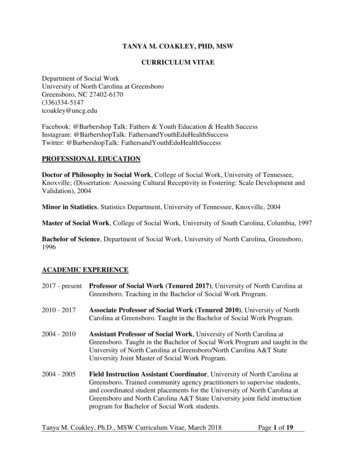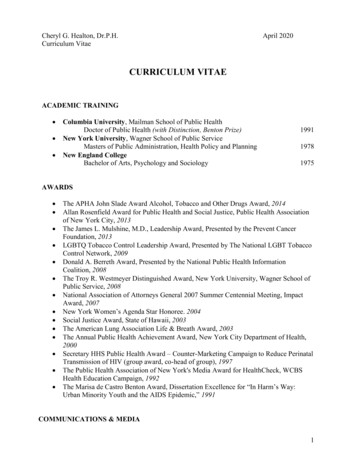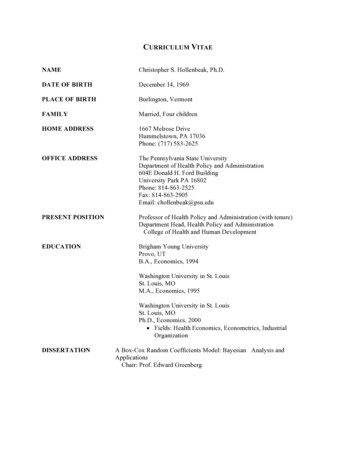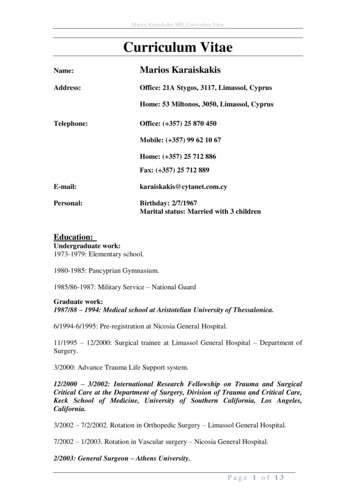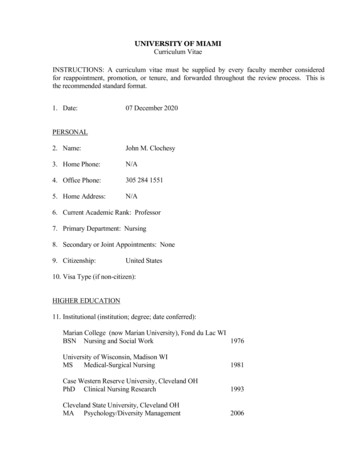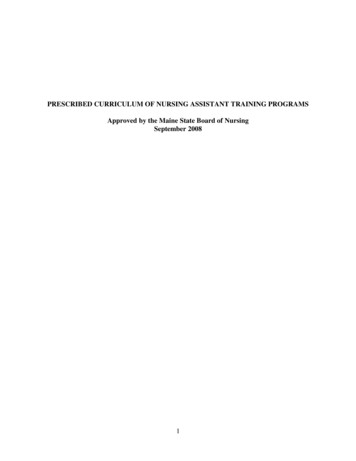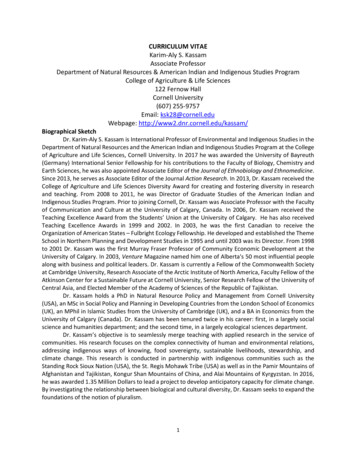
Transcription
CURRICULUM VITAEKarim-Aly S. KassamAssociate ProfessorDepartment of Natural Resources & American Indian and Indigenous Studies ProgramCollege of Agriculture & Life Sciences122 Fernow HallCornell University(607) 255-9757Email: ksk28@cornell.eduWebpage: http://www2.dnr.cornell.edu/kassam/Biographical SketchDr. Karim-Aly S. Kassam is International Professor of Environmental and Indigenous Studies in theDepartment of Natural Resources and the American Indian and Indigenous Studies Program at the Collegeof Agriculture and Life Sciences, Cornell University. In 2017 he was awarded the University of Bayreuth(Germany) International Senior Fellowship for his contributions to the Faculty of Biology, Chemistry andEarth Sciences, he was also appointed Associate Editor of the Journal of Ethnobiology and Ethnomedicine.Since 2013, he serves as Associate Editor of the Journal Action Research. In 2013, Dr. Kassam received theCollege of Agriculture and Life Sciences Diversity Award for creating and fostering diversity in researchand teaching. From 2008 to 2011, he was Director of Graduate Studies of the American Indian andIndigenous Studies Program. Prior to joining Cornell, Dr. Kassam was Associate Professor with the Facultyof Communication and Culture at the University of Calgary, Canada. In 2006, Dr. Kassam received theTeaching Excellence Award from the Students’ Union at the University of Calgary. He has also receivedTeaching Excellence Awards in 1999 and 2002. In 2003, he was the first Canadian to receive theOrganization of American States – Fulbright Ecology Fellowship. He developed and established the ThemeSchool in Northern Planning and Development Studies in 1995 and until 2003 was its Director. From 1998to 2001 Dr. Kassam was the first Murray Fraser Professor of Community Economic Development at theUniversity of Calgary. In 2003, Venture Magazine named him one of Alberta's 50 most influential peoplealong with business and political leaders. Dr. Kassam is currently a Fellow of the Commonwealth Societyat Cambridge University, Research Associate of the Arctic Institute of North America, Faculty Fellow of theAtkinson Center for a Sustainable Future at Cornell University, Senior Research Fellow of the University ofCentral Asia, and Elected Member of the Academy of Sciences of the Republic of Tajikistan.Dr. Kassam holds a PhD in Natural Resource Policy and Management from Cornell University(USA), an MSc in Social Policy and Planning in Developing Countries from the London School of Economics(UK), an MPhil in Islamic Studies from the University of Cambridge (UK), and a BA in Economics from theUniversity of Calgary (Canada). Dr. Kassam has been tenured twice in his career: first, in a largely socialscience and humanities department; and the second time, in a largely ecological sciences department.Dr. Kassam’s objective is to seamlessly merge teaching with applied research in the service ofcommunities. His research focuses on the complex connectivity of human and environmental relations,addressing indigenous ways of knowing, food sovereignty, sustainable livelihoods, stewardship, andclimate change. This research is conducted in partnership with indigenous communities such as theStanding Rock Sioux Nation (USA), the St. Regis Mohawk Tribe (USA) as well as in the Pamir Mountains ofAfghanistan and Tajikistan, Kongur Shan Mountains of China, and Alai Mountains of Kyrgyzstan. In 2016,he was awarded 1.35 Million Dollars to lead a project to develop anticipatory capacity for climate change.By investigating the relationship between biological and cultural diversity, Dr. Kassam seeks to expand thefoundations of the notion of pluralism.1
LanguagesKnowledge of: Arabic, French, Gujerati, Kiswahili, Katchi, and Persian, and fluent in English.EducationPh.D., Cornell University, USA, 2005.Major: Natural Resource Policy and ManagementMinors: Socio-Cultural Anthropology and Community and Regional SociologyDissertation Title: Diversity, Ways of Knowing, and Validity – A Demonstration of Relationsbetween the Biological and the Cultural among Indigenous Peoples of the Circumpolar NorthM.Sc., London School of Economics, UK, 1993.Major: Social Policy & Planning in Developing CountriesDissertation Title: Social Implications of NGO Promotion of Small-scale Enterprises for RuralDevelopment using Asian and African case studiesM.Phil., Cambridge University, UK, 1992.Major: Islamic StudiesDissertation Title: The Idea of Progress in Modern Muslim ThoughtCertificate, Institute of Ismaili Studies, UK, 1991.Major: Islamic StudiesB.A., University of Calgary, Canada, 1987.Major: EconomicsAreas of ExpertiseArctic Studies, Biocultural Diversity, Central Asian Studies, Coupled Socio-cultural and EcologicalSystems, Development Studies, Human Ecology, Indigenous Studies, Islamic Studies, NaturalResource Policy, Participatory Action Research, and Pluralism.Honors, Awards, and AppointmentsUniversity of Bayreuth (Germany) International Senior Fellowship (2017-2020).Associate Editor, Journal of Ethnobiology and Ethnomedicine (2017 to present).Faculty Member, Cornell University Library Board (2016-2020).Member of Advisory Board of the Reppy Institute of Peace and Conflict Studies, Cornell University(2015 – present).Elected Board Member, International Society of Ethnobiology (2014-2016).Associate Editor of the Action Research Journal (2014 – present).College of Agriculture and Life Sciences, Diversity Award for Research and Teaching (2013).Academician (elected member), Academy of Sciences Republic of Tajikistan (2012 – present).Senior Research Fellow, University of Central Asia (2010 – present).Faculty Fellow, Atkinson Center for a Sustainable Future (2009 – present).International Professor, Cornell University (2007 – present).Teaching Excellence Award, Students’ Union, University of Calgary (2006).Popular Professor, Maclean’s Guide to Universities (2004).Organization of American States – Fulbright Ecology Fellowship (2003 – 2005).Social Sciences and Humanities Research Council (SSHRC) Doctoral Fellowship (2003 – 2005).Named one of Alberta’s 50 Most Influential People, Alberta Venture magazine (2003).2
Recognized for Northern Scholarship, Canadian Senate and Public Service Commission (2003).Teaching Excellence Award, Students’ Union, University of Calgary (2002).Murray Fraser Professor of Community Economic Development (1998 – 2001).Teaching Excellence Award, Students’ Union, University of Calgary (1999).Research Associate, Arctic Institute of North America (1995 – present).Fellow of the Cambridge Commonwealth Society (1991).Aga Khan Foundation Scholarship (1989).Professional ExperienceIndependent Evaluator: Mountains Societies Research Institute, University of Central Asia - probono piblico (2014).Member, U.S. Steering Committee for the Intergovernmental Platform for Biodiversity andEcosystem Services (IPBES) (2014-present).Led Curriculum Development of Earth and Environmental Science Major, University of CentralAsia - pro bono piblico (2012-14).Co-Chair, Youth Nature and Outdoor Education Program Work Team - pro bono piblico (2013 –present).NSF Panel Reviewer, Experimental Program to Stimulate Competitive Research (EPSCoR) ReverseSite Visit (RSV) for reviewing the progress of three NSF Research Infrastructure Improvement(RII) Track-1 awards ( 20 Million each) (2013).Associate Editor, Action Research Journal. Editor responsible for manuscripts related toapplication of indigenous ecological knowledge and participatory action research in aninternational context - pro bono piblico (2013 – present).Consultant to the University of Central Asia, Lead design and development of the “Earth andEnvironmental Science” Undergraduate Curriculum - pro bono piblico (2012 – present).Director of Graduate Studies (elected), American Indian and Indigenous Studies Program, CornellUniversity, Ithaca, NY (2008 – 2011).Associate Professor of Environmental and Indigenous Studies, Department of Natural Resourcesand American Indian Program, Cornell University (2007 – present).Adjunct Professor, Faculty of Communication and Culture, University of Calgary, Calgary, Alberta,Canada (2007 – present).Lead Consultant, Sociocultural Team, Alaska Canada Rail Link Strategic EnvironmentalAssessment (2006-2007).Adjunct Professor, Faculty of Environmental Design, University of Calgary (1998 – 2007).Associate Professor, Faculty of Communication and Culture, University of Calgary (2007).Assistant Professor, Faculty of Communication and Culture, University of Calgary (2000 – 2007).Director, Theme School in Northern Planning and Development Studies, University of Calgary(1995 – 2003).Board Member, Ismaili Tariqa and Religious Education Board for Canada – Participated in policyand program planning for 75,000 Ismaili Muslims across Canada. Led a team that dealt with: (1)issues, concerns and program planning for 15,000 Ismaili Youth and (2) policy and programmingwith reference to the relationship between religious expression and cultural formation - probono piblico (1996 – 2002).3
Organized Symposium on Canada and September 11th – Raised funding for, and coordinatedparticipation of, nine speakers from NGOs, corporations, the Federal Cabinet, newspapermedia, academia, and the Native community - pro bono piblico (2002).Advisor, Committee on the Inusivut Exhibit, Glenbow Museum, Calgary – One of four advisorycommittee members who guided the objectives and messages that this Circumpolar Exhibit willconvey. The only academic and non-Inuit member of the advisory team. Responsible for thedevelopment of the exhibit and to provide comments on the substance of the ideas to beconveyed to ordinary citizens in order to raise awareness about the Canadian North - pro bonopiblico (2001 – 2003).Task Force Member, Expressions of the Pamir – Participated in the conceptualization,organization, and implementation of performances across Canada of 22 performing Artistsfrom the Pamir Mountains of Tajikistan and 8000 square feet exhibition of art and artifactsfrom Central Asia. Total cost of the project was approximately 1 Million, which was raisedfrom private donors, and 3000 volunteers across Canada gave of their time and energy - probono piblico (1998 – 1999).Facilitator, Canadian Polar Commission – Developed the Three Year Strategic Road Map for theMinister and Commissioners as a service to Canada (1999).Instructor II, Faculty of Communication and Culture, University of Calgary (1995 – 2000).Instructor, Faculty of Environmental Design (1994 – 1995).Manager of Professional Services, Arctic Institute of North America, University of Calgary (1994– 1995).Member of Design Team, Third World Planning for Real, London School of Economics, UK –Developed a model for an inexpensive and effective means of community participation for theidentification of needs and implementation of solutions - pro bono piblico (1993).Researcher, Ismaili Council of Syria, Examined the impact of six year drought on agriculturalcommunities and made recommendations for responses - pro bono piblico (1991).Business Research Analyst, Ministry of Economic Development and Trade, Alberta Government(1987 – 1989).President, World University Service of Canada – Established the first Refugee SponsorshipProgram at an Alberta University by creating a student funded endowment which enablesstudents to sponsor a new refugee student annually for undergraduate study and receiveCanadian Landed Immigrant status - pro bono piblico (1985 – 1987).Independent Evaluator, Aga Khan Rural Support Program (AKRSP), Pakistan (1985).Graduate Field MembershipAmerican Indian and Indigenous StudiesAsian StudiesInternational Agriculture and Rural DevelopmentNatural ResourcesPeace and Conflict StudiesTeaching ResponsibilitiesCornell UniversityWays of Knowing: Indigenous and Place-based Ecological Knowledge (2008 – present).4
Socio-cultural and Ecological Role of Diversity (2009 – present).Global Seminar: Building Sustainable Environments and Secure Food Systems (2013 – present).American Indian Studies II: Indigenous Issues in Global Perspectives (2010 – present).Food Systems and Poverty Reduction: Concepts and Themes – Module on Culture, Communityand Indigenous knowledge (2010 – 2013).Food Systems and Poverty Reduction: Integration – Module on Climate Change and its Impact onFood Systems (2011 – 2013).University of CalgaryCritical Perspectives of Development Practice and Resource Management (2005 – 2007).Sustainability and Human Ecology in the Circumpolar Arctic (2005 – 2007).Traditional Environmental Knowledge and Northern Development (2002 – 2007).Northern Development and Resource Management I (1995 – 2003).Northern Development and Resource Management II (1996 – 2003).Gender and Strategic Planning (1996 – 2003).Individual Internship Project – Service Learning (1995 – 2003).Group Internship Project – Service Learning (1995 – 2003).Development of the Canadian North (2003).Women’s Empowerment through Development (2000).Student Mentoring and AdvisingPost-Doctoral Associates/Fellows2015-presentMorgan Ruelle, PhD2015-2017Zahra Golshani, PhDGraduate Students—Committee Chair2017-presentLeo V Louis (MS, PhD)2017-presentEllen Nevers (MPS)2016-presentTalia Chorover (MS)2016-presentAbraham Francis (MS)2016-presentKayla Scheimreif (MS)2014-presentMichael Dunaway (PhD)2014-2016Michelangelo Lieberman (MPS)2013-2015Rajeev Goyal (MPS)2011-2017Murodbek Laldjebaev (PhD)2010-2015Chuan Liao (MS, PhD)2009-2015Michelle Baumflek (PhD)2009-2012Nicole Wilson (MS)2008-2015Morgan Ruelle (MS, PhD)2008-2015Jeffrey Wall (MPS, MS)2000-2003Darwin Peter Bateyko (MDP)1998-2003Robert A. Hawkesworth (MA)Graduate Students—Committee Member/Examiner5
g Fellows201820102010Shoshana Perey (MS)Robert Hunter (PhD)Robert Beazley (MS, PhD)Jennifer McKillop (MDP)Frederick McDonald (MFA)Aziz AliUmed BulbulshoevMunira KaramkhudoevaUndergraduate Honours Students—Research Advisor2016-2017Tamar Law2015-2016Anna Brown2015-2016Kelsey Poljacik2009-2011Sherry Martin2006-2007Tara Collins2002-2003May MahUndergraduate Research Assistants2017-presentMadeline Rich2016Nancy Cheng2015-presentJillian Solomon2008-2012Phoenix Storm Paz2006Lesley Campbell2006Tara Collins2006Jeffery Halvorsen2006Heath McLeodServiceCornell UniversityMember of Nepal and Himalayan Studies Advisory Committee (2017 – present).Member of South Asia Program Advisory Committee (2017 – present).Member of MPS Degree Programs Review Committee for the Global Development Graduate Fieldat Cornell University (2017 – present) – assess and make recommendations to the Dean of theGraduate School on the future of Master of Professional Studies in Agriculture and Life Sciencesand Master of Professional Studies in International Development.Member of Cornell University Library Board (2016 – present) – help formulate library policy forCornell’s Library system ( 60 Million) and serve as an advocate for the University Libraries.Member of Faculty Task Force on Curricular Practical Training (CPT) at Cornell University (2016 –present) – make policy recommendations to Vice Provost for International Affairs onInternships at Cornell University.Co-Organizer of Department of Natural Resources Seminar Committee (2015 – present).Member of Department of Natural Resources Post-Doctoral Committee (2015).6
Member of Department of Natural Resources Graduate Admissions Committee (2013 – 2016).Member, Language Task Force of the Provost, Cornell University – Developed policy for languageinstruction at Cornell University based on significance of languages to cognitive diversity andthe role of indigenous languages in applied biological and social science research as well as thehumanities (2013).Member, Land Grant Reconsidered – Sesquicentennial Celebrations (2012 – 2014).Faculty Fellow, American Indian & Indigenous Studies, Cornell University (2012 – 2013).Reviewer, Foreign Language and Area Studies (FLAS) Fellowship, Selection Committee, South AsiaProgram (2010; 2013).Grant Reviewer, Institute of Social Science (2010).Elected Member, Diversity Committee of the College of Agriculture and Life Sciences (2008 –2013).Elected, Director of Graduate Studies, American Indian Program (2008 – 2011).Member, Seminar Committee, Department of Natural Resources (2008).Faculty Fellow, American Indian program (2008).Member, Department of Natural Resources, Graduate Students Speakers Selection Committee –Planned a speaking event on Gorilla Conservation in Rwanda with attendance of 350 membersof the Ithaca Community and ensured front page coverage in the Ithaca Journal (2004).University of CalgaryMember, Faculty of Communication and Culture’s Committee on Appeals (2000 – 2007).Elected Member, Faculty of Communication and Culture’s Curriculum Committee (2005 – 2007).Representative of the Faculty of Communication and Culture to the Faculty of EnvironmentalDesign (2005 – 2007).Member, The Ernest C. Manning Endowment Campaign for The Program For Canadian Studies,Faculty of Communication and Culture, University of Calgary (2001 – 2003).Elected Member, Faculty Promotions Committee, Faculty of Communication and Culture (2002).Member, Selection Committee for Curator of Numismatics, Nickel Arts Museum (2000).Member of Council, Division of International Development of the International Centre (1995 –2000).Member, Grant Review Committee, Northern Scientific Training Program, University of Calgary.(1994 – 2001).Acting Executive Director, The Arctic Institute of North America in the absence of the ExecutiveDirector (1994 – 1999).Professional OrganizationsMember, Arctic Institute of North AmericaMember, Association of American GeographersFounding Member, Association for Environmental Studies and SciencesMember, Ecological Society of AmericaMember, International Society of EthnobiologyMember, International Society for the Study of Religion, Nature and CultureMember, Society for Applied Anthropology7
Research FundingRole: Lead Principal InvestigatorProject: Ecological Calendars and Climate Adaptation in the Pamirs (2016-2019)Funding Agency: Belmont Forum, including National Science Foundation USA ( 1.35 million)Overarching Objective: To build anticipatory capacity for climate change among mountaincommunities through the revitalization of ecological calendars.Specific Objectives: (1) Conduct participatory action research with indigenous communities in thePamir Mountains to document and analyze calendars of the human body and other existingecological calendars; (2) Revitalize and recalibrate ecological calendars by integrating indigenousecological knowledge with scientific data; (3) Test ecological calendars with the four Pamiricommunities; (4) Facilitate transfer of knowledge between communities in different bioclimaticzones; (5) Develop curricula for inter-generational transfer and adaptation of calendars; (6)Establish proof-of-concept for ecological calendars in mountain societies globally; (7) Host aninternational conference focusing on ecological calendars for improving food security andcommunity resilience.Role: Principal InvestigatorProject: Engaging Environmental Education through Teen Experiential Learning Programs (20162018)Funding Agency: Federal Formula Funds from the National Institute for Food & Agriculture (NIFA)of the USDA ( 27,500).Objectives: Develop curriculum to engender an ecological stewardship ethic through experientialengagement of 4H Youth Outdoor Education Programs.Role: Principal InvestigatorProject: Sustainable Forest Communities: Integrated Land Stewardship Strategy for NativeAmerican Land Claims (2015-2018)Funding Agency: USDA National Institute of Food and Agriculture, McIntire Stennis FederalCapacity Funds ( 80,110)Overarching Objective: To create an integrated biocultural land stewardship strategy for existingand newly settled land claims of the St. Regis Mohawk Tribe.Specific Objectives: (1) In partnership with Native American Governance Institutions, develop aframework for collaborative applied research in sustainable forest use, addressing ecological,economic, and sociocultural needs; (2) Undertake a comprehensive biocultural land use study ofexisting lands and newly settled land claims of the St. Regis Mohawk Tribe in the Northern Forest;(3) Develop an innovative, comprehensive, and culturally relevant stewardship strategy forexisting and newly settled land claims of the St. Regis Mohawk Tribe; and (4) Create audio visualcurriculum material on sustainable forest use and biocultural land stewardship for use in highschool and undergraduate environmental science education.Role: Principal InvestigatorProject: Ecological Calendars to Anticipate Climate Change (2015-18)Funding Agency: Atkinson Center for a Sustainable Future (ACSF): Academic Venture Fund( 98,956)8
Additional Award: 1000 Poster Competition on Research Findings (2016)Overarching Objective: To build anticipatory capacity for climate change at the level of thecommunity through the revitalization and development of ecological calendars.Specific Objectives: (1) Conduct participatory action research with indigenous and ruralcommunities to identify key vulnerabilities affecting communities’ livelihoods and food systemsand to document and archive existing ecological calendars, as well as ecological knowledge thatcould inform such calendars; (2) Analyze and integrate local and indigenous knowledge, historicalweather data, herbarium specimens, phenological records, and future climate projections toguide the development of ecological calendars; (3) Translate this transdisciplinary knowledge torevitalize and inform new ecological calendars in light of increasing climatic variation and applythem in specific indigenous and rural communities; (4) Host a high profile internationalconference focusing on ecological calendars for improving food security, enhancing climateliteracy, and building community resilience; and (5) Develop sustainable mechanisms for intergenerational transfer of this ecological knowledge to youth so that these calendars continue toinform climate change adaptation.Role: Principal InvestigatorProject: Igniting Innovation and Knowledge Exchange for Food and Health Sovereignty inIndigenous Mountain Communities (2014-15)Funding Agency: Atkinson Center for a Sustainable Future (ACSF): Rapid Response Fund ( 14,405)Objectives: 1) To spark knowledge exchange about food and health sovereignty in indigenousmountain communities; 2) To forge a network of researchers and practitioners working for foodand health sovereignty in indigenous mountain communities; and 3) To identify and developeffective communication strategies for researchers and practitioners to sustain linkages forindigenous food and health sovereignty initiatives.Role: Principal InvestigatorProject: Earth and Environmental Science Curriculum Development for an InternationalUniversity in Mountain Societies (2014)Funding Agency: South Asia Program: Internationalization Faculty Award ( 1500)Objectives: To develop Concept Note that sets out the guidelines for curriculum development ofthe Earth and Environmental Science Major for the University of Central Asia.Role: Principal InvestigatorProject: Engaging Environmental Education through Teen Experiential Learning Programs (20132016)Funding Agency: Federal Formula Funds from the National Institute for Food & Agriculture (NIFA)of the USDA ( 75,000).Objectives: Through experiential engagement with sustainability, youth will understand theimplications of their individual and collective behavior on their environment, food productionsystem, and their personal and community food sovereignty.Role: Co-Principal InvestigatorProject: Blueprint for Sustainable, Ecologically-based, Watershed Management in China:9
A Workshop on Lessons Learned Globally (2011).Funding Agency: Sean Jeffrey Lehman Fund for Scholarly Exchange with China, Cornell University( 15,000).Objectives: Address the socio-cultural dimensions of watershed management and presentfindings at an international workshop in China.Role: Co-Principal InvestigatorProject: Pluralism in Crisis (2010-2011).Funding Agency: Scottish Institute for Advanced Studies ( 25,000).Objectives: Create a dynamic interdisciplinary forum for responding to public and scholarlydebate over whether and when diversity and complexity are a source of strength or weakness incrisis situations, focusing on current policy-making, particularly on cultural/religious cohesion,ecological integrity, conflict, and development – This project is a continuation of the BeyondDiversity: Re-situating Pluralism Project. Three workshops were held in 2010 at the University ofGlasgow Scotland with a larger and committed group of multidisciplinary scholars. Emphasis wasplaced on establishing a common vocabulary and initiating collaborative research projects.Role: Principal InvestigatorProject: Guidelines for Incorporating Biocultural Diversity into Northern Forest ResourceManagement (2009-2012).Funding Agency: Northeastern States Research Cooperative ( 100,214).Objectives: Develop stewardship guidelines for incorporating biological and cultural diversity intoNorthern Forest resource management – In collaboration with Mi’kmaq and Maliseetcommunities of northern Maine, this applied research project focuses on access to non-timberforest products for indigenous communities with specific emphasis on medicinal plants. Researchoutcomes will be incorporated into curriculum material for public schools in Maine andundergraduate curriculum. Specifically stewardship guidelines will be prepared for tribalgovernance and other resource management agencies.Role: Co-Principal InvestigatorProject: Bridging Learners with Practitioners: Interdisciplinary Experiential Learning inConservation Science using Conservation Bridge (2009-2013).Funding Agency: National Science Foundation ( 149,698).Objectives: Test a new coupled human ecological systems model of engaging students inconservation science using authentic and service learning educational paradigms that developcollaborative and analytical skills to work across disciplinary and cultural boundaries – We aredeveloping case studies addressing major conservation issues linking civil society institutions withundergraduate students internationally at Beijing Normal University, University of Central Asia,and Cornell. A video and case study entitled “Climate change, food, and ‘sharing’ among theIñupiat of Wainwright, Alaska (2011)” have already been prepared.Role: Principal InvestigatorProject: Beyond Diversity: Re-Situating Pluralism (2008-2011).10
Funding Agency: Cornell Center for a Sustainable Future ( 12,000), Institute of Social Science( 5000), American Indian Program ( 1500); and the Einaudi International Center ( 1000).Objectives: Engage a multi-disciplinary group of scholars and leaders from civil society institutionsin developing a new vocabulary around the notion of pluralism – In 2009, a multidisciplinary teamgathered at the Department of Natural Resource’s Shackleton Research Station for three days tobegin examining the socio-cultural and ecological basis for pluralism. A resulting study examiningthe ecological basis for pluralism entitled “Pluralism, Resilience, and the Ecology of Survival: CaseStudies from the Pamir Mountains of Afghanistan (2010)” was published.Role: Co-Principal InvestigatorProject: Response of Coupled Socio-Cultural and Natural Systems to Development Projects inComplex Landscapes of Northwestern Yunnan, China: A Study of Conservation and SustainableDevelopment (2008-2009).Funding Agency: Sean Jeffrey Lehman Fund for Scholarly Exchange with China ( 15,000).Objectives: Focus attention of a multidisciplinary team of conservation and environmentalprofessionals on a very important region in China facing rapid change in order to serve as a modelfor studying coupled socio-cultural and natural systems – Developed field-based case study thatidentifies key research and development issues thereby setting priorities for collaborative efforts.A journal article entitled “Coupled socio-cultural and ecological systems at the margins: Arcticand Alpine cases (2010)” based on deliberations at a workshop held in China was published. Thisproject led to a new initiative for a Blueprint for Sustainable, Ecologically-based, WatershedManagement in China (2011).Role: Principal InvestigatorProject: Indigenous People, Alpine Human Ecology, and Change in the Pamir Mountains ofAfghanistan and Tajikistan (2007-2012).Funding Agency: Christensen Fund ( 158,300).Objectives: Assess the resilience capacity and develop relevant adaptation strategies resultingfrom ecological and socio-cultural changes in the Pamir of Afghanistan and Tajikistan – Byincorporating a human ecological lens that is sensitive to the indigenous and mountainouspopulation of the Pamir, this project advances the maintenance of biological and culturaldiversity while addressing change. Specific biocultural concerns of this project are: How do weground truth and develop a strategy for applied biocultural research based on the preliminaryfindings from 2006; What are the productive and strategic biocultural needs for Pamircommunities to sustain livelihoods; How can local and institutional knowledge be leveraged forbiocultural diversity conservation; How can we develop an internationally recognized universitycurriculum for human ecology that is sensitive to indigenous biocultural diversity in the Pamir;and How can other indigenous communities (in North America) contribute their knowledge,experiences, and expertise to the indigenous peoples of the Pamir? Publications resulting fromthis research include: “Viewing change through the prism of indigenous Human Ecology: Findingsfrom the Afghan and Tajik Pamirs (2009)” and “Medicinal plant use and Health Sovereignty:Findings from the Tajik and Afghan Pamirs (2010).”Role: Principal Investigator11
Project: Indigenous Knowledge, Food Security, an
Cornell University (607) 255-9757 Email: ksk28@cornell.edu . Dr. Kassam holds a PhD in Natural Resource Policy and Management from Cornell University (USA), an MSc in Social Policy and Planning in Developing Countries from the London School of Economics (UK), an MPhil in Islamic Studies from the University of Cambridge (UK), and a BA in .


